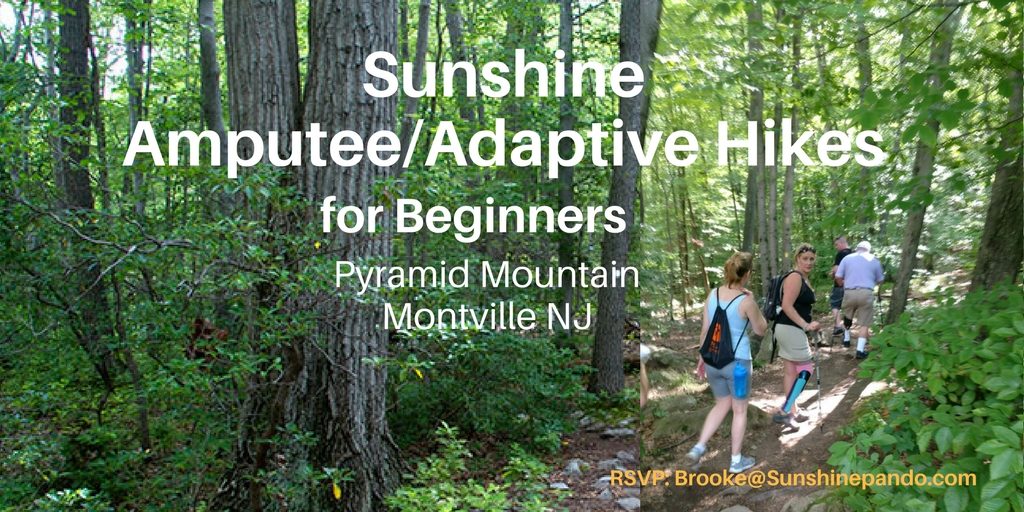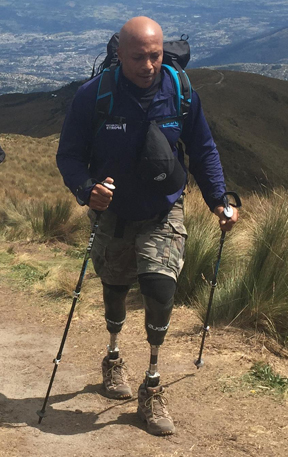
Hiking is a challenging and rewarding sport for everyone – yes, EVERYONE! Brooke Artesi, CPO/LPO and owner of Sunshine Prosthetics and Orthotics, is an avid hiker. She has organized and designed these Amputee/Adaptive Hikes for amputees and others with assistive devices to introduce the fun and benefits of hiking as well as to challenge and enrich lives. Friends and family are welcome to join.
 First Hike of the Season:
First Hike of the Season:
Sunday June 24th, 2018 1pm-3pm
The first hike of this season will be on June 24th and will be headed up by world renown athlete Reggie Showers. Reggie has been a double amputee since the age of 14 and his can-do spirit had led him to World Championships in Motorcycle Drag Racing, Mountain climbing around the world, trekking across Africa with a National Geographic team and becoming a powerful Motivational Speaker and Mentor.
Meetup at:
Pyramid Mountain Visitors Center
1pm
472 Boonton Avenue
Montville, NJ 07045
Limited Space – RSVP required by June 9th: [email protected]
All registrants will get a swag bag and are invited to join our meetup at the Blu Ale House in Riverdale NJ after the hike.
What is Adaptive Hiking?
Adaptive Hiking provides people with disabilities access to the benefits and enjoyment of hiking park or mountain trails using assistive technology or other personal supports, facilitated by asphalt paths or boardwalks, low gradients, trained guides. The resources listed below will give you further information and location of these trails across the country.
What levels of difficulty are involved?
Hiking trails have designations of easy, moderate, and difficult. Brooke’s meetup is the easy trail – short and relatively level, (however, not suitable for wheelchairs). Moderate trails require some degree of physical conditioning. You should exercise regularly, and be used to the high altitude of the park before attempting one. Difficult trails are steep and/or long, and require good physical conditioning, and, in higher elevations, acclimation to the high altitude in the park. Work your way up!
Why hike? It’s a glorious way to see the beauty of nature – lakes, rivers, wildlife, blooms and challenge yourself at the same time.
“Don’t limit your challenges, challenge your limits” (Jerry Dunn)
Never Hiked Before?
Check with your physician if you feel you are out of shape and start out slowly. This is the reason Brooke chose the beginner’s loop – it’s perfect for those starting out on this exhilarating sport.
For amputees, it’s also important to check with your prosthetist to make sure your socket is fitting properly. You certainly don’t want to develop sores.
For those wearing braces, AFOs, KAFOs and other assistive devices, check with your orthotist to see if any adjustments need to be made or if they have special advice to follow.
Make sure you stay hydrated. Bring water with you. You also may want sunglasses and a brimmed hat.
If you’ve bought new hiking boots, or walking shoes, make sure you’ve broken them in with short neighborhood walks before you hit the trail. And wear footwear designed with material to cushion and cradle the foot to absorb shock and increase stability. Remember your feet expand during the day. You want good arch and ankle support.
Don’t forget the importance of your socks. You want them to keep your foot dry, blister-free and comfortable. Prosthetic socks are crucial to cushion the residual limb, prevent pressure sores and adjust to volume change.
Think about using hiking poles for balance and to take some load off of knees and thighs. You may find one supplied by a tree along the trail or sporting stores have the kind that adjust to height and have springs to absorb shock. They’ll help with balance (and make you look like a seasoned hiker!)
Using a backpack? Good idea! Keep it simple and make sure it has comfortable harnesses. In addition to holding your water, you may also want to carry a first aid kit, tissues, sunscreen, energy food and whatever else you deem necessary. But don’t overload!
When choosing a hiking trail, take into account your capabilities. The Sunshine Beginner’s Hike has been designed by Brooke Artesi to introduce you to the fun and benefits of hiking. Hiking trails have designations of easy, moderate, and difficult. Brooke’s meetup is the easy trail – short and relatively level. Moderate trails require some degree of physical conditioning. You should exercise regularly, and be used to the high altitude of the park before attempting one. Difficult trails are steep and/or long, and require good physical conditioning, and, in higher elevations, acclimation to the high altitude in the park. Work your way up!
Ready for the challenge? Inspire yourself!
RESOURCES:
Disabled Sports USA – Their mission is to show how adaptive sports help youth, wounded warriors and adults with disabilities live happier, healthier lives.
America the Beautiful Access Pass (National Parks and Federal Recreational Lands Pass) Access Pass4 -Free pass for US citizens or permanent residents with permanent disabilities. Applicants must provide documentation of permanent disability and residency or citizenship. Obtain in person at a federal recreation site (see PDF list of federal recreation sites that issue passes) or through the mail using this application form (PDF). (NOTE: The cost of obtaining an Access Pass through the mail is $10 for processing the application (the pass is free).
Wheel-life.org – Wheel:Life is a global initiative that assists people in addressing the many questions and challenges that come with using a wheelchair, including hiking wheelchair adaptive trails.
INSPIRING HIKERS
Through the years we’ve written about several inspiring hikers – men and women who challenge themselves to go one step more – Brian Reynolds, bilateral BKA since the age of 4, hiking through Yosemite, the Grand Canyon, Inca trails in Peru, Stacey Kozel, lupus paralyzed her legs but she overcame that potential limitation with the computer controlled Ottobock C-brace and hit the Appalachian trail, Julian Torres, bilateral amputee, wounded warrior who trained on the trails in the California Mountains and then climbed Mt. Kilimanjaro and Reggie Showers, severe burns from hanging power lines caused him to be a BKA at the age of 14 but his fortitude and persistence led him from a successful auto racing career into hiking the grueling 200 mile trek on the migratory path of the African wildebeest for National Geographic’s Mygrations series.

